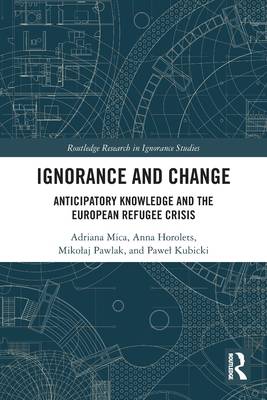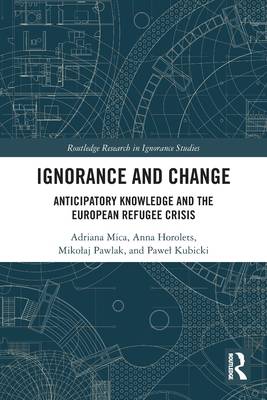
- Afhalen na 1 uur in een winkel met voorraad
- Gratis thuislevering in België vanaf € 30
- Ruim aanbod met 7 miljoen producten
- Afhalen na 1 uur in een winkel met voorraad
- Gratis thuislevering in België vanaf € 30
- Ruim aanbod met 7 miljoen producten
Ignorance and Change
Anticipatory Knowledge and the European Refugee Crisis
Adriana Mica, Anna Horolets, Mikolaj Pawlak, Pawel KubickiOmschrijving
Ignorance and Change analyses the European refugee crisis of 2015-2016 from the perspective of ignorance studies showing how the media, decision-makers and academics engaged in the projection and reification of the future in relation to the crisis, the asylum system, and the solutions that were proposed.
Why do recent crises fail to bring meaningful change? Why do we often see replication of the regimes of ignorance, inefficient knowledge and expertise practices? This book answers these questions by shifting the focus from the issue of change to our projections and expectations of what change will look like. Building on three comprehensive case studies, Poland, Hungary, and Romania, it demonstrates how ignorance and projectivity were essential for new Member States not only for managing the crisis but also for reaching a higher level of autonomy in relation to the EU.
Employing an innovative interactional approach to ignorance, it bridges ignorance studies with sociology of future and migration research. Challenging the dominant interest in defining ignorance, it moves the focus from what ignorance is to what ignorance does. It incorporates the concept of future into ignorance studies and develops notions such as "projective agency," "reification of the future," "projection by proxy," and "projectors of EU asylum policies." The book provides an erudite background, comprehensive empirical research, and original tools of analysis for graduate students, researchers, and policy makers interested in crisis studies, public policy, ignorance studies, social theory, migration studies, and sociology of the future.
Specificaties
Betrokkenen
- Auteur(s):
- Uitgeverij:
Inhoud
- Aantal bladzijden:
- 270
- Taal:
- Engels
- Reeks:
Eigenschappen
- Productcode (EAN):
- 9780367569228
- Verschijningsdatum:
- 30/05/2022
- Uitvoering:
- Paperback
- Formaat:
- Trade paperback (VS)
- Afmetingen:
- 156 mm x 234 mm
- Gewicht:
- 381 g

Alleen bij Standaard Boekhandel
Beoordelingen
We publiceren alleen reviews die voldoen aan de voorwaarden voor reviews. Bekijk onze voorwaarden voor reviews.











